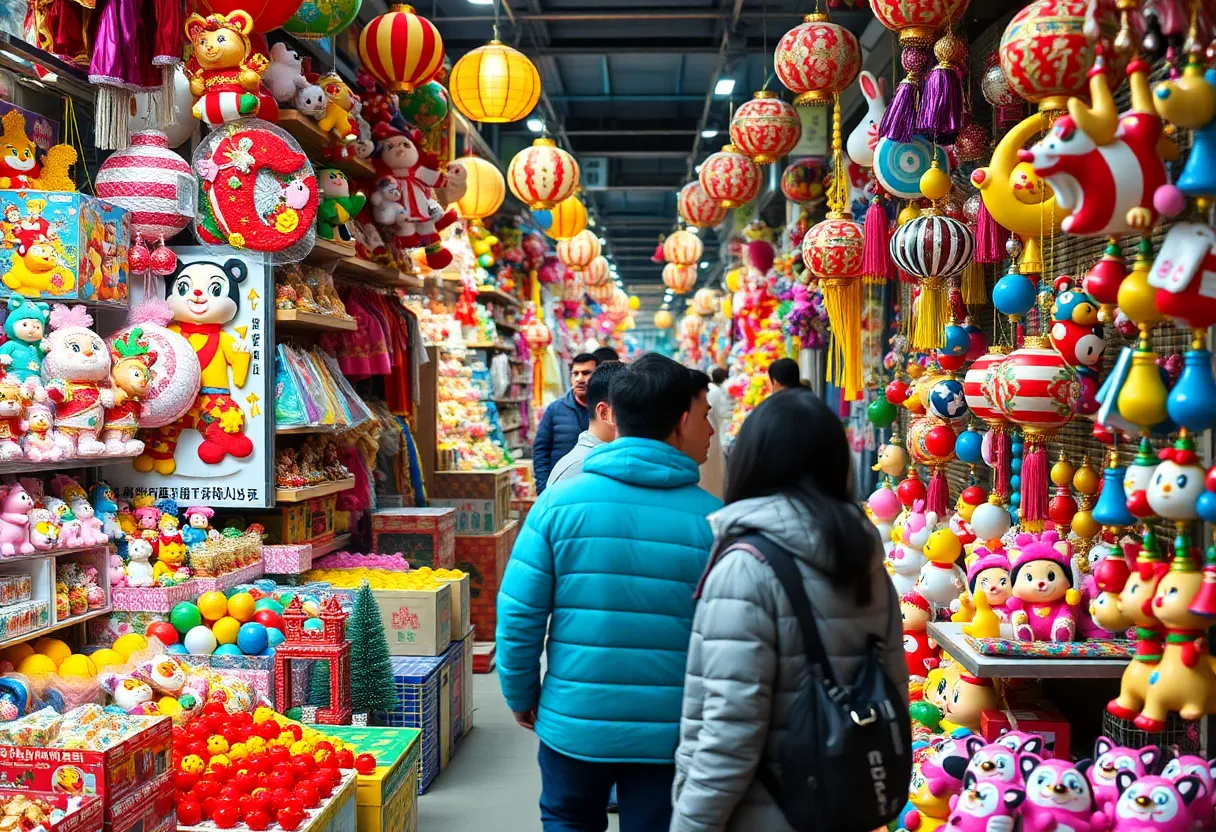News Summary
As trade tensions rise due to US tariffs, Chinese toy exporters are adapting by exploring new markets beyond the US. With tariffs reaching up to 245%, many are re-strategizing their sales approach, shifting focus to regions like South America and the Middle East. The repercussions of these changes are felt in the US, as retailers warn of potential empty shelves and price increases. Amidst this uncertainty, Chinese exporters show resilience as they work to navigate the complex landscape of global trade while learning new languages to connect with diverse buyers.
Shift in Focus for Chinese Toy Exporters Amid Trade Tensions
The bustling world of toy selling in Yiwu, China’s famed wholesale market, is undergoing a significant transformation. Known for housing over 75,000 shops that showcase everything from toys to electronics and home goods, Yiwu has long been a hub for global trade. However, ongoing tariffs resulting from the US-China trade war are prompting many toy exporters to rethink their strategies.
Changes in the Toy Business Landscape
In recent years, the landscape for toy exports from China has changed dramatically. With the Zhejiang province accounting for a sizable 17% of all Chinese sales to the US last year, you can feel the ripple effects of rising tariffs throughout the market. In 2024 alone, China exported approximately $34 billion worth of toys, with around $10 billion heading to US shores. However, these numbers are now clouded by tariffs ranging from up to 245%, leaving exporters scrambling for new strategies.
Enter Hu Tianqiang, who runs a stall named Zhongxiang Toys in Yiwu. Previously, about 20%-30% of his business came from US buyers, but that has all changed. Now, Hu is looking toward buyers in South America and the Middle East, showing a surprising resilience and adaptability in the face of challenging trade conditions.
Wider Consequences in the Market
As Chinese exporters pivot away from the US, the impacts are being felt across the pond as well. Toy shop owners in the US are sounding the alarm about the potential fallout from tariffs. Concerns are growing that the toy industry could face dire consequences, including the possibility of order cancellations that could strain businesses further. Esteemed retailers like Walmart and Target are already warning consumers about the potential for empty shelves and increased prices due to these trade challenges.
Meanwhile, US businesses are not alone in feeling the pressure. Many Chinese exporters are actively seeking buyers in less traditional markets, such as Africa and South America. This shift means that students in Yiwu are adapting by learning languages like Arabic and Spanish, aiming to communicate effectively in new markets.
Economic Uncertainty and the Bigger Picture
The ongoing trade war and resulting tariffs come with a backdrop of economic uncertainty in China. Projected growth for the country has been revised down to 4.5%, below the government’s target of 5%, indicating that the impacts of the trade war are not just confined to toy exporters. Businesses are facing a backlog of shipments, causing anxiety that the once-thriving export market may be in for tough times ahead.
Despite the gloom, there are reports indicating that some shipments from US retailers are beginning to restart. This news provides a glimmer of hope for both sides of the trade equation. However, President Trump’s remarks about how these tariffs could limit toy choices for American children—implying a future where children may only have two dolls instead of 30—continue to fuel the debate around the trade situation.
Looking Forward
As businesses in Yiwu adapt to this shifting landscape, many are focusing on enhancing their offerings and improving customer interactions. The sentiment exists that while the current tit-for-tat trade situation might persist for a few months, it cannot last indefinitely. With the US economy recently facing its own contractions, the immediate impact of tariffs raises new questions about the future of the toy industry on both sides of the Pacific.
While there are challenges ahead, the adaptive spirit of Chinese exporters is vibrant. As they explore new markets and diversify their offerings, the toy business in Yiwu may just find a way to thrive, even amidst the complexities of a simmering trade war.
Deeper Dive: News & Info About This Topic
- AP News
- Wikipedia: Trade War
- Wall Street Journal
- Google Search: US-China Trade War
- Bloomberg
- Encyclopedia Britannica: Tariff
- CNN
- Google News: US Toy Industry Tariffs
- New York Times
- Google Scholar: Tariffs and Trade War

Author: STAFF HERE ORLANDO WRITER
ORLANDO STAFF WRITER The ORLANDO STAFF WRITER represents the experienced team at HEREOrlando.com, your go-to source for actionable local news and information in Orlando, Orange County, and beyond. Specializing in "news you can use," we cover essential topics like product reviews for personal and business needs, local business directories, politics, real estate trends, neighborhood insights, and state news affecting the area—with deep expertise drawn from years of dedicated reporting and strong community input, including local press releases and business updates. We deliver top reporting on high-value events such as Orlando International Fringe Theatre Festival, Megacon Orlando, and Central Florida Fair. Our coverage extends to key organizations like the Orlando Economic Partnership and Hispanic Chamber of Commerce Metro Orlando, plus leading businesses in leisure and hospitality that power the local economy such as Walt Disney World Resort, AdventHealth, and Universal Orlando. As part of the broader HERE network, including HEREJacksonville.com, HEREPetersburg.com, HERETallahassee.com, and HERETampa.com, we provide comprehensive, credible insights into Florida's dynamic landscape.




